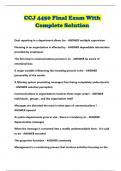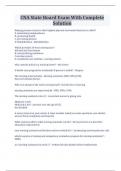GENOME TECHNOLOGY AND
APPLICATIONS: CLONING
INTRODUCTION: CELL-BASED
DNA CLONING
PRINCIPLES OF DNA CLONING
DNA cloning can be cell based: it happens in 4 steps
1. In vitro construction of a recombinant DNA molecule
a. Recombinant = combining different pieces of DNA, bv animal and human
2. Transformation
a. Bacteria can take up foreign DNA
b. It is a key step in DNA cloning
c. Occurs after restriction digest and ligation and transfers newly made plasmids into bacteria
3. Selective propagation of clones
a. After transformation, bacteria are selected on antibiotic plates
b. Bacteria with the plasmid are antibiotic-resistant will form a colony
4. Isolation of recombinant DNA clones
Colonies with the right plasmid can be grown to make large cultures of identical bacteria = used to produce
plasmid or make protein
DNA cloning = The process of making multiple, identical copies of a specific piece of DNA. The gene or other
DNA fragment of interest is first inserted into a circular piece of DNA = a plasmid. The insertion is done by ‘cut
and paste’ enzymes. The produce a molecule of recombinant DNA, or DNA assembled out of fragments from
multiple sources.
The recombinant plasmid is introduced into bacteria. The bacteria
that carry the plasmid are selected and grown up (they are AB-
resistant). As they reproduce, they replicate the plasmid and pass
it on to their offspring, making copies of the DNA it contains
(more plasmid = more DNA/gene of interest).
Used for: Bv the human insulin gene is expressed in E. Coli
bacteria to make insulin used by diabetics. The plasmid-carrying bacteria are used as ‘factories’ to make
protein.
The 4 steps of DNA cloning
1. In vitro construction of a recombinant DNA molecule
Requires: cutting + pasting of DNA
Restriction endonucleases (restriction enzymes)
DNA ligase
,Requires: a replicon
A piece of DNA that makes independent DNA replication possible
Replicon : host-specific
Replicon : a construct called vector = containing many features used in the cloning process
2. Transformation
Transformation = Recombinant DNA molecule is introduced in a host cell
Host cell = mostly yeast or bacterium
o Easy to grow
o Fast reproduction
For expression studies cloning is often done in eukaryotic cells (mammalian/insect cells)
o For expression studies, cloning in a bacterium usually precedes (het gaat vooraf aan) cloning
in the host used for the expression
o So they also need cloning in bacteria, cloning in bacteria is needed (almost) every time: the
cloning in bacteria is a preparation for cloning in eukaryotic cells (when everything is ready,
the clones are put in the eukaryotic cells)
, 3. Selective propagation of clones
Cells are plated on agar
- Each individual cell forms a colony
- Each colony is a clone: all cells are identical + have the same ancestor cell
- 1 colony can be grown in liquid medium to obtain more cells
If the colonies are to small (left plate), you cannot identify the
colonies
4. Isolation of recombinant DNA clones
Now the cells have formed colonies on the agar plate
The recombinant DNA is purified from the cells
Last step: lysis and purification
- U take out the construct, you can do this with a sterile pen
- Purify the recombinant DNA clones
- U take the recombinant DNA clones out of the identical cell clones
APPLICATIONS: CLONING
INTRODUCTION: CELL-BASED
DNA CLONING
PRINCIPLES OF DNA CLONING
DNA cloning can be cell based: it happens in 4 steps
1. In vitro construction of a recombinant DNA molecule
a. Recombinant = combining different pieces of DNA, bv animal and human
2. Transformation
a. Bacteria can take up foreign DNA
b. It is a key step in DNA cloning
c. Occurs after restriction digest and ligation and transfers newly made plasmids into bacteria
3. Selective propagation of clones
a. After transformation, bacteria are selected on antibiotic plates
b. Bacteria with the plasmid are antibiotic-resistant will form a colony
4. Isolation of recombinant DNA clones
Colonies with the right plasmid can be grown to make large cultures of identical bacteria = used to produce
plasmid or make protein
DNA cloning = The process of making multiple, identical copies of a specific piece of DNA. The gene or other
DNA fragment of interest is first inserted into a circular piece of DNA = a plasmid. The insertion is done by ‘cut
and paste’ enzymes. The produce a molecule of recombinant DNA, or DNA assembled out of fragments from
multiple sources.
The recombinant plasmid is introduced into bacteria. The bacteria
that carry the plasmid are selected and grown up (they are AB-
resistant). As they reproduce, they replicate the plasmid and pass
it on to their offspring, making copies of the DNA it contains
(more plasmid = more DNA/gene of interest).
Used for: Bv the human insulin gene is expressed in E. Coli
bacteria to make insulin used by diabetics. The plasmid-carrying bacteria are used as ‘factories’ to make
protein.
The 4 steps of DNA cloning
1. In vitro construction of a recombinant DNA molecule
Requires: cutting + pasting of DNA
Restriction endonucleases (restriction enzymes)
DNA ligase
,Requires: a replicon
A piece of DNA that makes independent DNA replication possible
Replicon : host-specific
Replicon : a construct called vector = containing many features used in the cloning process
2. Transformation
Transformation = Recombinant DNA molecule is introduced in a host cell
Host cell = mostly yeast or bacterium
o Easy to grow
o Fast reproduction
For expression studies cloning is often done in eukaryotic cells (mammalian/insect cells)
o For expression studies, cloning in a bacterium usually precedes (het gaat vooraf aan) cloning
in the host used for the expression
o So they also need cloning in bacteria, cloning in bacteria is needed (almost) every time: the
cloning in bacteria is a preparation for cloning in eukaryotic cells (when everything is ready,
the clones are put in the eukaryotic cells)
, 3. Selective propagation of clones
Cells are plated on agar
- Each individual cell forms a colony
- Each colony is a clone: all cells are identical + have the same ancestor cell
- 1 colony can be grown in liquid medium to obtain more cells
If the colonies are to small (left plate), you cannot identify the
colonies
4. Isolation of recombinant DNA clones
Now the cells have formed colonies on the agar plate
The recombinant DNA is purified from the cells
Last step: lysis and purification
- U take out the construct, you can do this with a sterile pen
- Purify the recombinant DNA clones
- U take the recombinant DNA clones out of the identical cell clones




